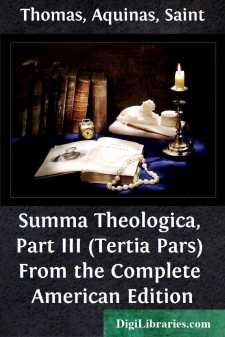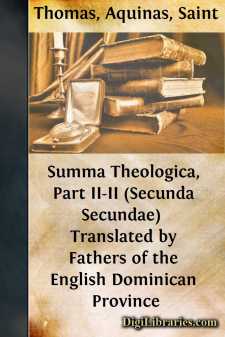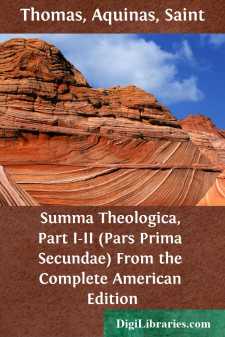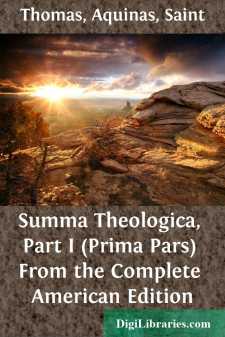Categories
- Antiques & Collectibles 13
- Architecture 36
- Art 48
- Bibles 22
- Biography & Autobiography 813
- Body, Mind & Spirit 142
- Business & Economics 28
- Children's Books 15
- Children's Fiction 12
- Computers 4
- Cooking 94
- Crafts & Hobbies 4
- Drama 346
- Education 46
- Family & Relationships 57
- Fiction 11828
- Games 19
- Gardening 17
- Health & Fitness 34
- History 1377
- House & Home 1
- Humor 147
- Juvenile Fiction 1873
- Juvenile Nonfiction 202
- Language Arts & Disciplines 88
- Law 16
- Literary Collections 686
- Literary Criticism 179
- Mathematics 13
- Medical 41
- Music 40
- Nature 179
- Non-Classifiable 1768
- Performing Arts 7
- Periodicals 1453
- Philosophy 64
- Photography 2
- Poetry 896
- Political Science 203
- Psychology 42
- Reference 154
- Religion 513
- Science 126
- Self-Help 84
- Social Science 81
- Sports & Recreation 34
- Study Aids 3
- Technology & Engineering 59
- Transportation 23
- Travel 463
- True Crime 29
Summa Theologica, Part III (Tertia Pars) From the Complete American Edition
by: Aquinas Thomas
Categories:
Description:
Excerpt
In a few places, where obvious errors appeared in the Benziger Brothers edition, I have corrected them by reference to a Latin text of the Summa. These corrections are indicated by English text in brackets. For example, in Part I, Question 45, Article 2, the first sentence in the Benziger Brothers edition begins: "Not only is it impossible that anything should be created by God…." By reference to the Latin, "non solum non est impossibile a Deo aliquid creari" (emphasis added), this has been corrected to "Not only is it [not] impossible that anything should be created by God…."
This electronic edition also differs from the Benziger Brothers edition in the following details (as well as the obvious lack of the original page numbers and headers):
* The repetitive expression "We proceed thus to the [next] Article" does not appear directly below the title of each article.
* Italics are represented by underscores at the beginning and end, like this. Quotations and other "quotable" matter, however, are ordinarily set off by quotation marks with no underscores in this edition, in accordance with common English usage, even where they were set in italics with no quotation marks in the Benziger Brothers edition. Titles of books are set off by underscores when they appear in the text with no parentheses, but not when the books are cited in parentheses.
* Bible chapters and verses are cited with arabic numerals separated by colons, like this: "Dan. 7:10"—not like this: "Dan. vii. 10." Small roman numerals have been retained where they appear in citations to books other than the Bible.
* Any matter that appeared in a footnote in the Benziger Brothers edition is presented in brackets at the point in the text where the footnote mark appeared.
* Greek words are presented in Roman transliteration.
* Paragraphs are not indented and are separated by blank lines.
* Numbered topics, set forth at the beginning of each question and at certain other places, are ordinarily presented on a separate line for each topic.
* Titles of questions are in all caps.
Anything else in this electronic edition that does not correspond to the content of the Benziger Brothers edition may be regarded as a defect in this edition and attributed to me (David McClamrock). _______________________
CONTENTS
THIRD PART (QQ. 1-90)
Question
1. Of the Fitness of the Incarnation 2. Of the Mode of Union of the Word Incarnate 3. Of the Mode of Union on the Part of the Person Assuming 4. Of the Mode of Union on the Part of the Human Nature 5. Of the Parts of Human Nature Which Were Assumed 6. Of the Order of Assumption 7. Of the Grace of Christ as an Individual Man 8. Of the Grace of Christ as He Is the Head of the Church 9. Of Christ's Knowledge in General 10. Of the Beatific Knowledge of Christ's Soul 11. Of the Knowledge Imprinted or Infused on the Soul of Christ 12. Of the Acquired or Empiric Knowledge of Christ's Soul 13. Of the Power of Christ's Soul 14. Of the Defects of Body Assumed by the Son of God 15. Of the Defects of Soul Assumed by Christ 16. Of Those Things Which Are Applicable to Christ in His Being and Becoming 17. Of Christ's Unity of Being 18. Of Christ's Unity of Will 19. Of the Unity of Christ's Operation 20. Of Christ's Subjection to the Father 21. Of Christ's Prayer 22. Of the Priesthood of Christ 23. Of Adoption as Befitting to Christ 24. Of the Predestination of Christ 25. Of the Adoration of Christ 26. Of Christ as Called the Mediator of God and Man — Editorial Note: St. Thomas and the Immaculate Conception 27. Of the Sanctification of the Blessed Virgin 28....





